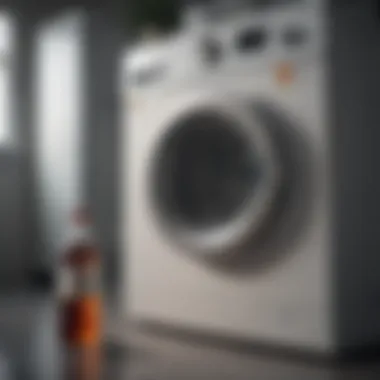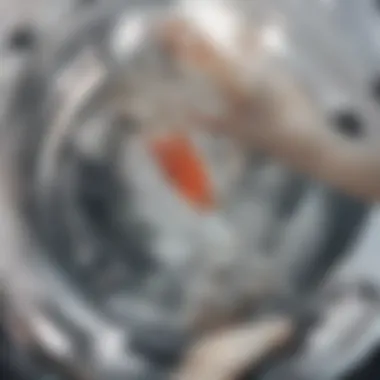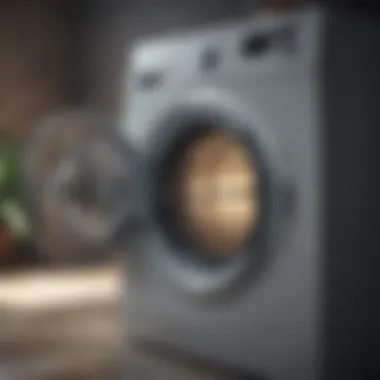Harnessing Vinegar for Optimal Washing Machine Care


Intro
Vinegar has gained attention in recent years as an effective cleaning agent. Many homeowners seek alternative cleaning methods that are both cost-effective and environmentally friendly. These aspects make vinegar an attractive option for maintaining household appliances, especially washing machines. This article will delve into how vinegar can enhance the cleaning process for washing machines, explore its efficiency compared to conventional cleaners, and provide a systematic approach to its use.
Understanding the chemical properties of vinegar is crucial. Its acidic nature helps break down mineral deposits, odors, and detergent residues that accumulate over time. Additionally, using vinegar can prolong the lifespan of your washing machine. Many people overlook machine maintenance, which can lead to costly repairs and damage.
In the following sections, we will cover various benefits of vinegar, practical steps for incorporating this cleaning method, safety considerations, and tips for achieving optimal machine performance. Misconceptions about vinegar's effectiveness will also be unraveled, and comparisons with commercial cleaners will shed light on the advantages of this common household item.
Prolusion to Washing Machine Maintenance
Maintaining the washing machine is essential for effective home management. Regular cleaning prevents buildup and extends the life of the appliance. A machine that is well looked after operates more efficiently, using less energy and water. This not only lowers utility bills but also contributes to a sustainable environment. Moreover, neglecting maintenance can lead to unpleasant odors and even costly repairs.
Importance of Regular Cleaning
Regular cleaning of a washing machine must not be overlooked. Debris, lint, and detergent residues accumulate over time. This can hinder performance and affect the quality of each wash cycle. If left unchecked, these deposits create an environment that promotes mold and mildew growth. A poorly maintained machine will smell bad and may even stain clothes. Thus, incorporating a routine cleaning schedule is necessary for optimal functioning.
Benefits of maintaining your washing machine include:
- Improved efficiency in cleaning clothes.
- Reduction in unwanted odors.
- Prolongation of appliance life.
Common Issues in Washing Machines
Washing machines, like all appliances, are susceptible to issues if not maintained properly. Owners may experience problems such as leaks, clogs, and malfunctioning doors. It is crucial to recognize these common issues early on. Leaks could stem from damaged hoses or improper sealing. Clogs often arise from lint traps or filters that have not been cleaned.
Some additional frequent issues that can occur are:
- Unbalanced loads causing vibrations.
- Noisy operation due to foreign objects.
- Detergent buildup affecting cleaning.
Maintaining your washing machine through consistent cleaning and inspections helps avoid these problems. Keeping tabs on these factors ensures smoother operation and longevity.
The Role of Vinegar in Household Cleaning
Vinegar is often underestimated as a formidable household cleaning agent. Its versatility is rooted in its chemical composition, making it not only effective but also safe for many applications around the home. Understanding the role vinegar plays in household cleaning is essential, especially when considering alternatives to commercial cleaners that may contain harsh chemicals. Furthermore, as we emphasize using more natural cleaning solutions, vinegar stands out due to its low impact on the environment.
The use of vinegar in household cleaning can lead to various benefits. First, it is non-toxic, which is especially important in households with children or pets. Its ability to cut through grease and grime makes it suitable for different surfaces, therefore providing a multi-purpose cleaning solution. This can lead to cost savings as users need not purchase multiple specialty cleaners. Additionally, its natural acidity can help neutralize bad odors and disinfect common areas, contributing to a healthier living environment.
Overall, the role of vinegar in household cleaning aligns with a shift toward sustainable practices. Its availability, affordability, and effectiveness mark it as a favorable choice.
Chemical Composition of Vinegar
Vinegar primarily consists of acetic acid and water. The typical household vinegar, white distilled vinegar, contains about 5% acetic acid. This acidic property is what makes it an effective cleaner, as it can dissolve mineral deposits and break down biological materials.
The acetic acid present allows vinegar to interact with various compounds, making it an excellent choice for removing odors and stains. This simple yet effective chemical composition enhances its cleaning ability without introducing potentially harmful substances into the home environment.
Vinegar's Antibacterial Properties


Vinegar is often noted for its antibacterial properties. While it may not have the same potency as commercial disinfectants, its ability to reduce bacteria is significant. Studies have shown that vinegar can effectively kill around 90% of bacteria, making it a reasonable option for everyday cleaning tasks.
When used regularly in washing machines, vinegar can help prevent the growth of mold and mildew, especially in areas prone to moisture accumulation. It's crucial to remember that vinegar should not replace bleach or other stronger disinfectants in situations requiring high-level sanitation, such as cleaning after foodborne illnesses.
"Vinegar's effectiveness as an antibacterial agent is enhanced when used in a diluted form or mixed with water, offering a gentle yet impactful solution for household cleaning."
In summary, vinegar's role in household cleaning is prominent due to its chemical properties, anti-bacterial function, and environmental considerations. Its inclusion in washing machine maintenance is just one of many applications that highlight its potential.
Benefits of Using Vinegar in Washing Machines
Using vinegar as a cleaning agent in washing machines presents several significant benefits. This is essential knowledge for anyone looking to maintain their appliance effectively. Vinegar’s natural properties can enhance cleaning, prolong the machine's lifespan, and even protect the components that are crucial for optimal functionality. The allure of vinegar lies in its combination of affordability and effectiveness.
Reduction of Odors
Washing machines can develop unpleasant odors due to mold, mildew, and detergent residues. These smells can transfer to clothes, leaving them less than fresh. Vinegar is effective for neutralizing these odors. When used regularly, the acidic nature of vinegar breaks down the residues that cause bad smells.
To remedy odor, pour two cups of vinegar directly into the drum and run a hot water cycle. This method disinfects and deodorizes the machine without the need for harsh chemicals. It is a simple task that benefits not only the machine but also the freshness of laundry.
Limestone and Mineral Buildup Removal
Another critical advantage of vinegar in washing machines is its ability to combat limestone and mineral buildup. Hard water can leave deposits that not only clog the machine but can also affect washing performance. Vinegar dissolves mineral deposits effectively due to its high acidity. Regular cleaning with vinegar can prevent long-term damage to the internal components.
Adding a cup of vinegar to the detergent drawer and running a hot cycle regularly helps to maintain clean pipes and prevent blockages. This process can extend the life of the appliance and ensure it operates at peak efficiency.
Maintaining Rubber Seals and Gaskets
The rubber seals and gaskets in a washing machine are crucial for preventing leaks and maintaining proper function. Over time, these components may wear down due to buildup or bacteria growth. Vinegar can clean and maintain these seals effectively. By using vinegar, you can remove any soap scum or mildew that may accumulate.
To clean the rubber seals, wipe them down with a cloth soaked in a mixture of equal parts water and vinegar. This enhances the integrity of the seals and ensures they continue to function as intended. Keeping these components in good shape can also prevent washing machine leaks, saving on potential repair costs.
In summary, the benefits of using vinegar in washing machines are multifaceted. From reducing odors to maintaining critical components, vinegar proves itself to be a practical, cost-effective solution for washing machine maintenance.
How to Clean a Washing Machine with Vinegar
Cleaning a washing machine with vinegar is an effective maintenance strategy. This method is both economical and environmentally friendly. Vinegar’s natural properties help combat odors and mineral buildup, leading to enhanced machine performance. Regular cleaning not only prolongs the life of the appliance but also ensures that laundry remains fresh.
Step-by-Step Cleaning Process
- Gather Supplies: You will need white distilled vinegar, a measuring cup, and a clean cloth or sponge. Avoid any harsh chemicals during this process to ensure the vinegar can work effectively without interference.
- Fill the Drum: Start by setting your washing machine to the hottest and largest setting. Once the drum fills with water, pause the cycle and add two to four cups of white distilled vinegar. This step is crucial as the vinegar needs time to mix with the water and penetrate any grime.
- Soak: Allow the mixture to sit for about an hour. This soaking time enables the vinegar to dissolve the mineral deposits and eliminate any musty smells.
- Run the Cycle: After soaking, resume the normal wash cycle. The hot water will help to further break down residues, while the vinegar clears out any leftover soap scum and odors.
- Wipe Down Components: Once the cycle is complete, take a cloth or sponge soaked in vinegar to clean the rubber seals and detergent dispensers. This step helps remove any remaining buildup and keeps these areas clean.
- Rinse: Finally, run a rinse cycle with just water to ensure all vinegar and loosened debris is flushed out of the machine.
It is important to note that the process may vary slightly depending on the model of the washing machine. Checking the user manual for specific instructions can be beneficial.
Recommended Frequency of Cleaning
For optimal performance, it is ideal to clean your washing machine with vinegar every one to three months. If you frequently wash heavily soiled items or use hard water, you might consider cleaning it more regularly.


- Monthly Routine: If your laundry habits involve heavier loads or the use of fabric softeners, a monthly cleaning is advisable.
- Quarterly Maintenance: For standard usage, a cleaning every three months will generally suffice.
- Signs for Immediate Cleaning: Unpleasant odors, visible buildup in rubber seals, or slower drainage can indicate that it’s time for a cleaning session.
Regular maintenance of a washing machine extends its life and maximizes cleaning efficiency. Using vinegar allows consumers to opt for a natural solution, minimizing reliance on commercial cleansers.
Safety Considerations
Understanding safety considerations is vital when using vinegar as a cleaning agent for your washing machine. While vinegar is a safe and natural product, being aware of how it interacts with other cleaners and potential risks of excessive use is essential to maintain an effective cleaning routine.
Compatibility with Other Cleaners
When combining vinegar with other cleaning agents, one must exercise caution. Vinegar is an acid, and mixing it with alkaline substances, such as baking soda, can lead to reactions that neutralize its cleaning properties. Furthermore, combining vinegar with bleach creates harmful chloramine vapors, which are dangerous to inhale. Therefore, it is best to use vinegar as a standalone cleaning agent. If you wish to enhance cleaning effects, consider using vinegar in a sequence or separate from chemical cleaners.
Potential Risks of Excessive Use
While vinegar is safe for regular cleaning, using it excessively can lead to unintended consequences. The acidity of vinegar can wear down rubber seals and gaskets within the washing machine if overused. This degradation can lead to leaks, ultimately affecting the machine’s efficiency. It’s advisable to adhere to recommended cleaning frequencies to avoid such damage. Generally, once a month is sufficient.
Ultimately, prioritizing safety ensures that your washing machine remains in good condition while benefiting from the natural cleaning properties of vinegar.
Vinegar Exposure: Efficacy versus Commercial Cleaners
Understanding the effectiveness of vinegar compared to commercial cleaners is crucial for those looking to maintain their washing machines in an eco-friendly and cost-effective manner. Vinegar has long been praised in household cleaning, yet its practical applications need careful evaluation against specialized products designed for such tasks.
Cost-Effectiveness Analysis
When considering cleaning agents for washing machines, cost is often a decisive factor. Vinegar is significantly cheaper than many commercial cleaners. Depending on the brand, commercial cleaners can range from $5 to $20. In contrast, a liter of vinegar seldom exceeds $2. Not only does this make vinegar an attractive option for regular maintenance, but it also means it can fit into a household budget with ease.
Moreover, vinegar's dual role as a cleaning agent and a deodorizer enhances its value. While some might argue that the upfront costs for branded cleaners do provide a guarantee of effectiveness, the routine use of vinegar can yield similar or even better results over time.
Environmental Impact
In today’s eco-conscious world, the environmental footprint of cleaning agents plays an essential role in decision-making. Commercial cleaners often contain chemicals that can cause harm to aquatic ecosystems when washed down drains. Many of these substances are non-biodegradable, presenting long-term risks.
Conversely, vinegar is a natural product. Its components are biodegradable and do not contribute to environmental damage. Using vinegar conserves resources as it reduces the need for more potential harmful products. This is an advantage for the conscientious consumer who wishes to minimize their ecological impact.
"Choosing vinegar over commercial cleaning products may provide a solution that is both budget-friendly and environmentally responsible."
User Experience Perspectives
User experience plays a vital role in evaluating any cleaning method. Many individuals report satisfactory results when using vinegar for laundry machines. Users often highlight the fresh scent and elimination of mildew effectively. With regular use, vinegar alleviates mineral buildup and helps promote the washing machine's optimal functioning.
However, not all users are entirely convinced. Some express doubts regarding vinegar's efficacy against tougher grime or detergent residues. For stubborn stains, a concentrated commercial cleaner may seem more appealing at first glance. But when used properly, vinegar can maintain a washing machine's performance over time.
In summary, vinegar acts as a cost-friendly and environmentally safe cleaner. While its effectiveness may vary among users, many find it serves their cleaning needs adequately. Integrating vinegar into regular washing machine maintenance allows for significant savings and minimal environmental impact.
Misconceptions about Cleaning Agents


When discussing the effectiveness of cleaning agents, it is essential to address the misconceptions that surround them. Many opinions stem from incomplete information or evolving science. In the context of using vinegar as a cleaner for washing machines, these misunderstandings can lead to skepticism or misuse. Recognizing and clarifying these myths can empower users to make informed choices about their cleaning processes. By demystifying vinegar's role, we can uncover its potential benefits and limitations in washing machine maintenance.
Debunking Myths about Vinegar
Many myths circulate about vinegar's cleaning capabilities. One common misconception is that vinegar is ineffective against tough stains and grime. While it is true that vinegar may not completely remove all forms of dirt, its acidity helps to break down mineral deposits and soap scum. For instance, a solution of vinegar diluted with water can tackle minor buildup in the machine’s drum and hoses, particularly beneficial in high-mineral-water areas. This offers practical use without the negative effects that some harsher chemicals can impose on the machine itself.
Another myth claims that using vinegar in washing machines can damage components such as rubber seals. However, research suggests that when used correctly, vinegar is rather gentle. It helps maintain rubber fittings rather than breaking them down, especially when cleaning is done properly and not excessively. Therefore, engaging with the potential of vinegar demands a nuanced understanding, allowing for beneficial cleaning without fear of harming the equipment.
Understanding Cleaning Efficacy
Understanding the efficacy of any cleaning agent involves examining its chemical properties in relation to the cleaning task at hand. Vinegar, primarily composed of acetic acid, possesses natural antibacterial attributes. This property makes it suitable for tackling mold and mildew growth, common issues in washing machines. By breaking down these organisms, vinegar helps maintain not only cleanliness but also the hygiene of the machine.
Moreover, the efficacy of vinegar as a cleaning agent can vary depending on various factors, including concentration levels and contact time. For instance, a higher concentration of vinegar may yield more remarkable effects. Users should also consider their specific cleaning needs, as vinegar excels in specific tasks while other commercial cleaners may be necessary for heavier duty jobs. Thus, evaluating the right context for vinegar's use aligns with the objectives of preserving machine longevity while achieving effective cleaning.
"Misunderstandings about cleaning agents, like vinegar, often lead to missed opportunities for utilizing effective and economical solutions for home maintenance."
Long-Term Impact on Washing Machine Performance
Understanding the long-term impact of utilizing vinegar to clean a washing machine is paramount for ensuring optimal performance. While immediate effects may be felt, the ongoing benefits can significantly influence the lifespan of the appliance. Regular cleaning with vinegar not only helps to maintain cleanliness but also protects the internal workings of the machine.
One of the most notable advantages is the reduction in drum residue. Over time, detergent and fabric softener residues can accumulate, potentially leading to odor retention and declining performance. By incorporating vinegar into the cleaning process, you can mitigate these issues. Vinegar is effective in breaking down these residues, which could further prevent maintenance issues related to the drum.
Moreover, vinegar serves to maintain essential components like rubber seals and gaskets. These parts are crucial in ensuring that the washing machine operates correctly. When they become dirty or coated with residue, they can lose their efficacy. Regular vinegar treatments contribute to keeping these components clean and functional.
"Using vinegar not only cleans but also preserves essential washing machine components, leading to a prolonged life of the appliance."
Furthermore, the simple act of including vinegar in your cleaning routine may convey cost savings over time. Machines that remain in good condition tend to require fewer repairs and replacements, which are often costly. By prioritizing cleaning methods like vinegar, you invest in the longevity of your washing machine.
Effects on Drum and Components
The drum is the heart of a washing machine. Any build-up of residues can directly affect its efficiency. Vinegar, with its mild acidity, effectively neutralizes scale and minerals. By regularly using vinegar, you can help the drum remain free of unwanted deposits that dull its ability to clean effectively.
Additionally, protecting the internal components of the washing machine should not be overlooked. By maintaining clean rubber gaskets and seals, vinegar ensures a watertight operation. These components play a key role in preventing leaks, which can be damaging over time.
Impact on Warranty Considerations
Lastly, the use of vinegar for cleaning can have implications regarding warranty considerations. Many manufacturers stipulate specific cleaning guidelines. Using vinegar, which is a natural and non-toxic cleaner, may align well with these regulations. However, some brands might have reservations against vinegar's long-term usage. It is vital to review the warranty terms for your washing machine when adopting this cleaning method.
Finale and Recommendations
In this final section, the importance of understanding how to effectively clean a washing machine using vinegar cannot be overstated. Cleaning a washing machine is vital for ensuring its longevity and optimal performance. As seen throughout this article, vinegar serves as a cost-effective and environmentally friendly alternative to commercial cleaning agents. Its natural properties help combat odors, reduce mineral buildup, and maintain the integrity of rubber seals and gaskets.
Summary of Key Findings
To wrap up, here are the crucial points discussed in previous sections:
- Vinegar’s Effectiveness: Vinegar, due to its acetic acid content, acts efficiently against grease, dirt, and mineral deposits. It is particularly useful in maintaining cleanliness without introducing harmful chemicals.
- Routine Maintenance: Incorporating vinegar cleaning into a regular maintenance schedule can extend the lifespan of a washing machine. It reduces the risk of ongoing issues caused by neglect.
- Safety Measures: While vinegar is generally safe, it is necessary to avoid mixing it with certain cleaning agents, as it may lead to harmful reactions. Additionally, moderation in its usage will prevent potential damage or excessive acid exposure to machine components.
Final Thoughts on Vinegar Cleaning Method
Vinegar proves to be a practical and effective solution for washing machine maintenance. By regularly using it, you not only address immediate cleaning needs but also promote the long-term health of your appliance. For those who prioritize sustainability and cost-effective methods, integrating vinegar into your cleaning routine is a commendable choice.







